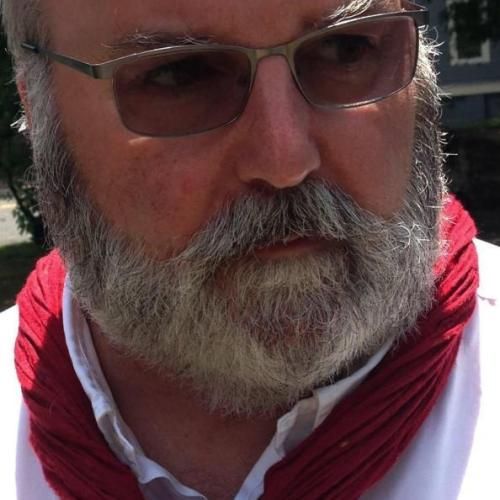Overview
Research Description
Seaman's work often explores an expanded media-oriented poetics through various technological means — Recombinant Poetics. Such works often explore the combination and recombination of media elements and processes in interactive and generative works of art. Seaman enfolds image/music/text relations in these works, often creating all of the media elements and articulating the operative media-processes involved. He is self-taught as a musician/composer. He often collaborates with others in terms of his musical output.
Media Research - Recombinant Informatics and Neosentience
Seaman has been interested in meaning production and has explored ideas around computational meta-meaning systems— systems that enable a user to become mindfully aware of how meaning is arising and changing through their interaction. He is deeply interested in new forms of computation, learning systems, the concept of creating a computational system based on the working of the human body and mind/brain (Neosentience research), as well as the concept of Computational Creativity – both using the computer as a creative tool, as well as articulating the future of creative potentials as explored via computational devices. He has won a number of awards including two honorable mention awards from Ars Electronica in Interactive Art; Intel Research Gift (3 years); Awards in the Visual Arts – Rockefeller Foundation; Fulbright Distinguished American Scholar (Senior Technological Specialist); International German Video Art Prize; NEA Fellowship; Semens’ Stipendium; and Leonardo Award for Excellence, among others. In 2021 he was presented with a lifetime achievement award from ACM SIGGRAPH for his pioneering work in “Recombinant Poetics / Recombinant Informatics / Neosentience.”
He has been commissioned on a number of occasions including William Forsythe and Ballett Frankfurt (Sleepers Guts) for video/set design; the Museum of Image and Sound - MIS Museum, Sao Paulo, Brazil – Architecture of Association (with Daniel Howe); Tanz_Performance Köln – Inversion (with Regina van Berkel); Vision Ruhr — Exchange Fields (with Regina van Berkel); National Gallery of Canada — Red Dice | Des Chiffré; Greatwoods & Leonard Slatkin, Guest Conductor Pittsburgh Symphony — Pictures at an Exhibition (video for live performance); and the Contemporary Art Television Fund (CAT) – The Water Catalogue.
More recently he has been exploring notions surrounding Recombinant Informatics — a multi-perspective approach to inventive knowledge production. The work - The Insight Engine 2.0 (currently in progress) explores interactive Koestler-like bisociation processes for the exploration of crossing disciplinary boundaries and stimulating unconventional thought in research. This generative experimental search-engine work was initially funded by the Duke Institute for Brain Sciences and Bass Connections – The Brain and Society. Seaman is currently working on a series of art/science collaborations — poetic installations and scientific research papers. The book Neosentience | The Benevolence Engine with Otto Rössler came out through Intellect Press. It explores the history as well as the future of AI and Robotics. Ongoing discussions with Rössler and a new book are in the works exploring Rössler's entire research career - Chaos, Information and The Future of Physics - The Seaman Rössler Dialogues with Information Annotations by Seaman and Mark Burgin (World Scientific). Seaman has also collaborated with artist/computer scientist Daniel Howe on multiple works exploring AI and creative writing/multi-media and has completed two albums of experimental music with Howe, one entitled Minor Distance, the more recent release is entitled Dispositions. He has developed a series of new generative works and is undertaking new forms of interface research in particular exploring new visualization systems with game engines. He has also collaborated with Craig Tattersall from The Boats / The Humble Bee, The Remote Viewer et. al. They have finished a large audio work (over 7 hours) entitled Light Folds (working in part with Ciompi Quartet at Duke) and are working on a new album. He also ollaborated with vocalist Marissa Bergmann on a new series of sonic works - A solo album called f (noir). He is a member of the Duke Institute For Brain Sciences. He co-runs The Emergence Lab with John Supko, Media Arts + Sciences at Duke University. Seaman and Supko's album s_traits exploring AI collaboration was discussed in the top 10 for new Classical music in the New York Times in 2012. Seaman and Supko in 2018 premiered a major experimental Opera called The Oper& exploring image, music and text relations as driven by, as well as textually exploring AI. Seaman has also been appointed as a professor in Duke's Music Department.
Education
Seaman studied at Rhode Island School of Design (Foundations, Video and Sculpture), The San Francisco Art Institute (Scuplture, Performance, Installation), MIT (Master of Science in Visual Studies), and the University of Wales (at the Center for Advanced Inquiry in Interactive Art) for his PhD. He ihas also finished another new book (Intellect Press) – From the Architecture of Ideas: The Life and Work of Ranulph Glanville, Cybernetician.
Recent News
Most recently Seaman had a print retrospective, derived in part from his long career exploring generative interactive systems at the Rubenstein Art Center at Duke - Selections from the Archive. A free catalog download is available from billseaman.com (as well as links to many research papers and work archives). A physical catalog is also available from LULU.com.
Expertise
Generative poetic systems, interactive art, experimental art, music, installation art, generative computational tools, new forms of computation, recombinant informatics, recombinant poetics, Neosentience research.

